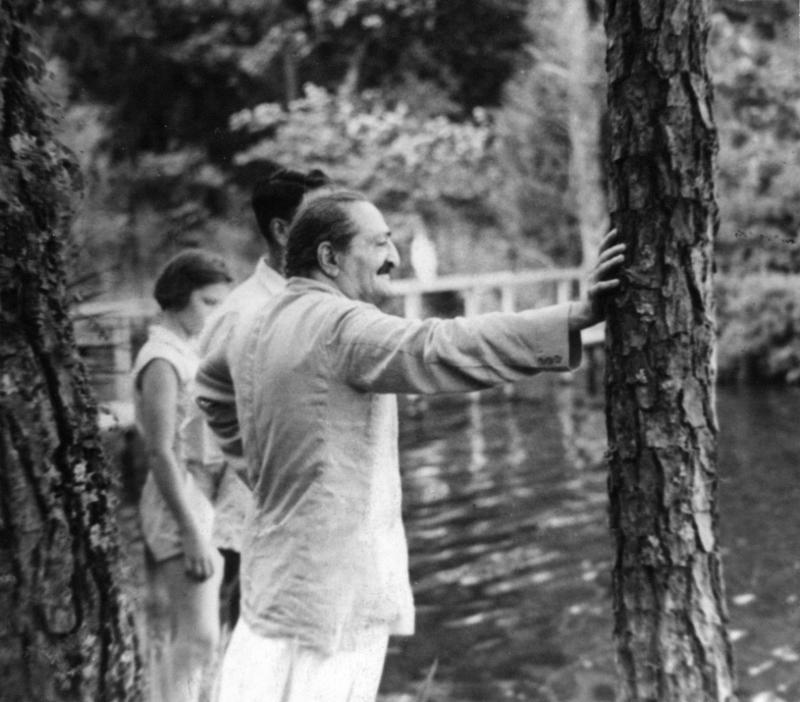
April 30, 2021
Labor of Love
“For us, however, it is only hopelessness and helplessness. How else can I describe to you what our New Life is?” This was the last line of the “Song of the New Life,” which Baba sent to Elizabeth and Norina in 1949 as they toiled at the Center, preparing for His long-awaited arrival. It also seems to describe the work that Baba Himself was doing for the Center, half-way around the world.
On August 2, 1949, Baba had sent Elizabeth and Norina to America from India to get the Center ready for Him. Just a week later, in Myrtle Beach, they received a telegram from Him: “Am disposing of everything here and positively entering new life of absolute renunciation from sixteenth October.”[1]
Baba soon sent them another telegram, that “everyone in the East and West have been informed to stop all communications with me forever.”[1] But He made one exception: “I give you two the freedom (after 16th of October) to cable me whenever necessary, only regarding [my visit to the Center]”[1]
Then Baba embarked on His indefinable New Life, wandering across India, renouncing His role of “Master,” going cold and hungry, bowing to thousands of saints, suffering for God as an aspirant. And as Elizabeth and Norina did their own work—preparing the cabins, building Baba’s house, trying to put together finances for the upcoming trip—they were in close touch with Him about all of it. At one point, Baba cabled that they were “participating [in the New Life] by following all cables and letters sent up to date.”[1]
But in addition to the complications Elizabeth and Norina faced in preparing for Baba’s trip, there were increasing complications for Baba: His health was deteriorating due to the strains of the New Life, and He changed His proposed arrival date numerous times. His companion Doctor Donkin wrote a letter to Mildred Kyle in 1951: “I really do think that Baba must come West next February or March, or not for ages and ages.”[1] Still, Baba had Donkin write to Elizabeth and Norina: “Baba tells me to repeat and repeat that his coming is DEFINITE, not only because of the desire of the people in the West that he should come, but also because of what is destined by God.”[2]
Finally, in late 1951, after years of painstaking work, Elizabeth cabled Baba that the Center was ready for Him. Baba replied how happy their work had made Him, and that He would come in March or April of next year, “If God so wills it and if I am alive.”[1] Then He went into the seclusion of His Manonash phase—Manonash, or “annihilation of mind.” Soon after, He began preparing to leave for Myrtle Beach.
But Baba’s suffering only seemed to increase. He had a severe reaction to the smallpox vaccine He was required to take for the journey to the West: His arm and armpit swelled up and He had pox marks and a fever. On March 17, Elizabeth and Norina were cabled: “Baba’s condition is getting worse every day, but He still says that ‘unless impossible, will come, because if not this time, then I will never come.’”[3] Padri wrote in a note to Adi Sr. around that time, “God help Baba and the West!”[4]
Baba and His companions spent the week before they were set to leave in Bombay, and in addition to the health problems Baba’s mood darkened and intensified. Looking tired and haggard, Baba asked Eruch to telegraph the following to those staying in Ahmednagar, Meherabad and Meherazad: “Health is not good. There is much disturbance in and around the building … Although going to the West is a must, visit to the West seems uncertain.”[5] When Meheru describes the women Mandali’s perception of Baba’s state at the time, she ends simply: “We felt it was His work.”[6]
Finally, in spite of everything, the day came: April 18th, when Baba and His party got on the plane for the home that had waited for Him for so long.
When Baba arrived at the Center, His sister Mani described feeling Baba’s presence so strongly that it seemed He had already been there. Baba happily greeted Norina and Elizabeth, told them how pleased He was with their work, with their love. And then, a few days later, He said to a few of His close ones: “Most persons suffer because of their karma. A few suffer for others. Masters suffer for the whole universe.”[7] All the work and hardship over those many years, for Elizabeth and Norina and for Baba Himself, all part of the unfathomable labor of love.
[1] The Meher Center and Meher Baba’s New Life, Video by Jamie and Zo Newell[2] Lord Meher Online, p. 3043
[3] Lord Meher Online, p. 3035
[4] Mehera Meher, Vol. 3, p.12
[5] Lord Meher Online, p. 3040
[6] Talk by Meheru Irani, 1993, courtesy of Avatar Meher Baba Center of Southern California
[7] Lord Meher Online, p. 3047